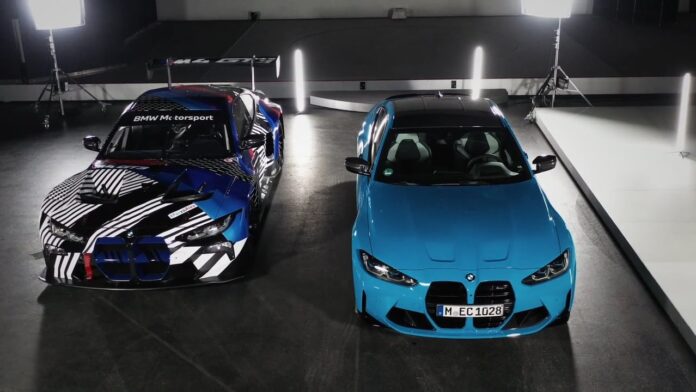From series production to the race track – and back: In a new video, BMW M GmbH offers insights into the development of the new BMW M4 GT3 racing car and identifies some fascinating similarities between the new flagship model in the BMW M Motorsport line-up and the BMW M4 Competition production model (fuel consumption combined: 10.2 – 9.9 l/100 km [27.7 – 28.5 mpg imp] in the WLTP cycle, 10.2 l/100 km [27.7 mpg imp] in NEDC; CO2 emissions combined: 233 – 227 g/km in WLTP, 234 g/km in NEDC). Designers and engineers from BMW’s production car development program and BMW M Motorsport present interesting details about the two cars, with the BMW M4 Design Talk featuring Anne Forschner, Exterior Designer BMW M4 Competition, and Michael Scully, BMW Group Designworks Global Automotive Director, getting the ball rolling.
The video starts with Forschner and Scully talking about the most striking design feature of the two cars: the BMW kidney grille. “All BMW M cars have a polarising effect, which means they do not automatically appeal to everyone. Their impact on people is both physical and emotional,” says Forschner. “The kidney grill retains the production car’s perimeter geometry, while their interior surfaces have been opened-up and celebrate the care and feeding of the race engine’s enhanced cooling requirements for the M4 GT3.” explains Scully. The BMW M4 GT3 – which is currently in its final year of development – has been designed to help BMW M Motorsport teams compete for race victories and titles around the world from 2022. Scully continues: ”The M4 GT3’s added front corner lights reference the production car’s air curtain location and give identity and visual structure to an aerodynamically critical portion of the race car. Their boomerang shape mimics the natural shadow of the production car’s front facia surfaces, and supplements high speed night time visibility during endurance races.”
Viewed from the side, it is clear that the racing car implements the same constellation of design elements as the production car to define the bodyside: with one “continuity loop” created from the upper greenhouse/A pillar, front fender detail, and upward-sweeping lower bodyside feature.
The roof, with its two longitudinal fins, and the heavily raked rear window are also identical in form on both the BMW M4 Competition and BMW M4 GT3. These elements enable an ideal flow of air to the racing car’s rear wing.
The greatest differences between the two cars can perhaps be found at the rear. “The tail of the BMW M4 GT3 is familiar in some areas, but in others it looks very different,” says Anne Forschner. “The racing car is 75 millimetres wider on each side, but we have carried over the rear lights from the production car and the rear contour of the boot lid is also the same,” adds Michael Scully.
Forschner points out how the many likenesses between the duo, which already give the standard model a very sporty appearance and provide an excellent basis for the race version, clearly reflect how the two cars were developed: “From the road to the race track and from the race track back to the road.” Meanwhile, Scully is fulsome in his praise of his colleagues from series production. “The BMW M4 Competition production model represents a wonderful basis on which to make a racing car. It has iconic elements and geometry geared to delivering high performance and efficiency.”
Discover more from SNAP TASTE
Subscribe to get the latest posts sent to your email.



